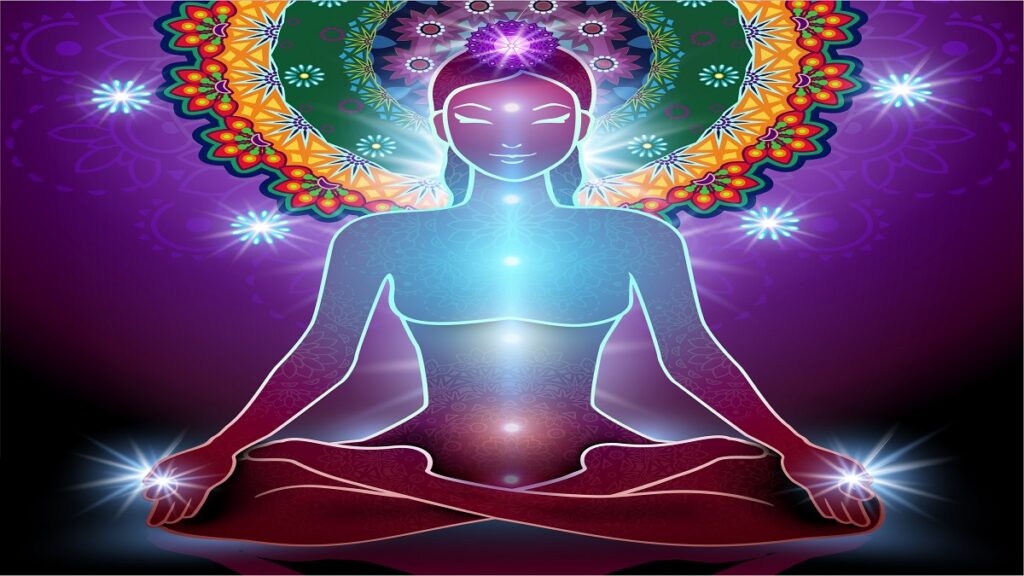Introduction
Chakras, the energy centers within the human body as understood in various spiritual traditions, have been increasingly intersecting with psychological discourse in recent years. While traditionally associated with spiritual practices like yoga and meditation, the concept of chakras has found resonance in the field of psychology. This essay aims to delve into the psychological dimensions of chakras and explore their potential impact on mental health. By examining the interplay between energy centers and psychological well-being, we can gain insight into holistic approaches to mental health that integrate spiritual and psychological perspectives.
Understanding Chakras: An Overview
Before delving into their psychological implications, it’s essential to establish a foundational understanding of chakras. In various Eastern traditions, particularly within Hinduism and Buddhism, chakras are depicted as spinning wheels or vortexes of energy located along the central axis of the body. There are typically seven main chakras, each associated with specific physical, emotional, and spiritual attributes.
- Root Chakra (Muladhara): Located at the base of the spine, the root chakra is associated with feelings of safety, security, and basic survival instincts.
- Sacral Chakra (Swadhisthana): Positioned in the lower abdomen, the sacral chakra governs emotions, creativity, and sexuality.
- Solar Plexus Chakra (Manipura): Situated in the upper abdomen, the solar plexus chakra is linked to personal power, self-esteem, and confidence.
- Heart Chakra (Anahata): Found in the center of the chest, the heart chakra relates to love, compassion, and emotional balance.
- Throat Chakra (Vishuddha): Located in the throat region, the throat chakra is associated with communication, self-expression, and authenticity.
- Third Eye Chakra (Ajna): Positioned between the eyebrows, the third eye chakra governs intuition, insight, and inner wisdom.
- Crown Chakra (Sahasrara): Situated at the top of the head, the crown chakra is associated with spiritual connection, higher consciousness, and enlightenment.
Chakras and Psychological Attributes
While the existence of chakras cannot be empirically verified in the same way as physical organs, their psychological significance lies in the symbolism and metaphor they represent. Each chakra corresponds to specific psychological attributes and developmental stages, providing a framework for understanding human consciousness and behavior.
- Root Chakra and Security: The root chakra’s association with safety and survival aligns with psychological theories such as Maslow’s hierarchy of needs. Individuals with imbalances in this chakra may exhibit symptoms of anxiety, fear, or a lack of stability in their lives.
- Sacral Chakra and Creativity: The sacral chakra’s connection to creativity and sensuality underscores its relevance to psychological concepts like self-expression and pleasure. Imbalances in this chakra may manifest as issues with emotional intimacy, creative blocks, or feelings of guilt and shame.
- Solar Plexus Chakra and Personal Power: The solar plexus chakra’s role in personal power and self-esteem mirrors psychological constructs such as self-efficacy and confidence. Individuals with imbalances in this chakra may struggle with issues of self-worth, assertiveness, or a tendency toward perfectionism.
- Heart Chakra and Emotional Well-being: The heart chakra’s emphasis on love, compassion, and empathy resonates with psychological theories of attachment and interpersonal relationships. Imbalances in this chakra may lead to difficulties in forming meaningful connections, issues with forgiveness, or a sense of emotional detachment.
- Throat Chakra and Communication: The throat chakra’s association with communication and self-expression aligns with psychological concepts related to assertive communication, authenticity, and active listening. Imbalances in this chakra may manifest as difficulty expressing oneself, fear of public speaking, or feelings of being unheard or misunderstood.
- Third Eye Chakra and Intuition: The third eye chakra’s connection to intuition and inner wisdom parallels psychological theories of intuition, gut feelings, and unconscious processing. Imbalances in this chakra may result in a lack of clarity, difficulty making decisions, or a sense of disconnection from one’s inner guidance.
- Crown Chakra and Spiritual Connection: The crown chakra’s emphasis on spiritual connection and higher consciousness intersects with psychological concepts of transcendence, meaning-making, and existential well-being. Imbalances in this chakra may manifest as feelings of existential angst, a lack of purpose or spiritual fulfillment, or difficulties in accessing states of transcendence or flow.

Implications for Mental Health
Understanding the psychological dimensions of chakras can have significant implications for mental health treatment and self-care practices. Integrating chakra work with traditional therapeutic approaches can offer a holistic framework for addressing psychological issues and promoting overall well-being.
- Chakra-Based Therapy: Therapeutic interventions informed by chakra psychology, such as energy healing modalities like Reiki or chakra balancing exercises, can complement traditional psychotherapy by addressing issues at the energetic level.
- Mind-Body Integration: Recognizing the interconnectedness of mind, body, and spirit, approaches that integrate chakra work with somatic experiencing, mindfulness practices, and expressive arts therapies can facilitate holistic healing and self-discovery.
- Self-Exploration and Empowerment: Engaging in chakra-focused practices, such as meditation, journaling, or visualization exercises, can empower individuals to explore their inner landscape, cultivate self-awareness, and take an active role in their mental health journey.
- Transpersonal Psychology: Drawing from transpersonal psychology principles, which emphasize spiritual dimensions of human experience, chakra psychology offers a framework for addressing existential concerns, facilitating personal growth, and fostering a sense of interconnectedness with the universe.
Conclusion
Chakras, with their rich symbolism and metaphorical significance, offer a unique lens through which to explore the intersection of psychology and spirituality. By understanding the psychological attributes associated with each chakra, we can gain insight into the complexities of human consciousness and behavior. Integrating chakra work with traditional therapeutic approaches holds promise for promoting holistic healing and fostering psychological well-being. As we continue to explore the psychological dimensions of chakras, we deepen our understanding of the intricate interplay between mind, body, and spirit in the journey toward wholeness and self-actualization.


